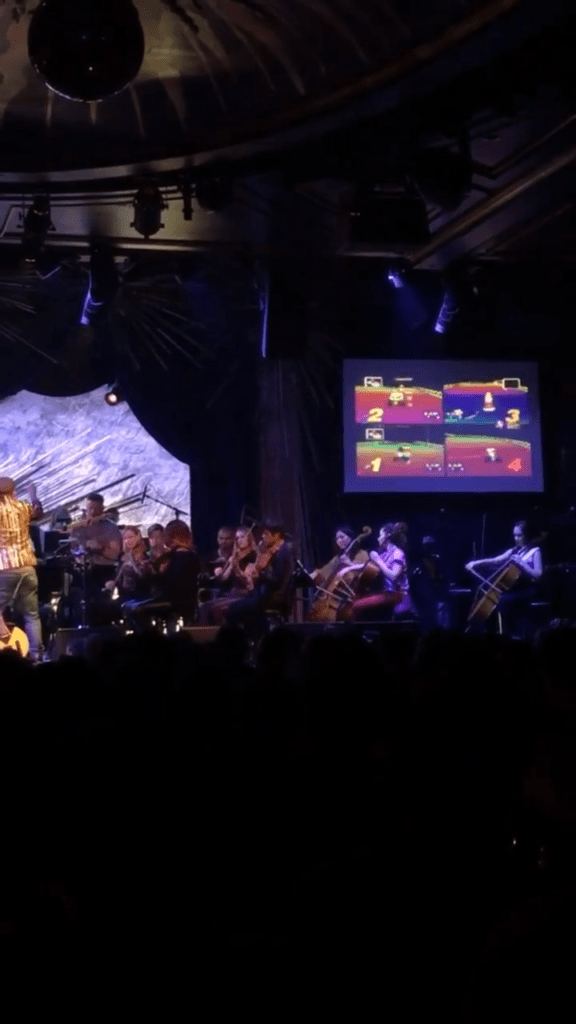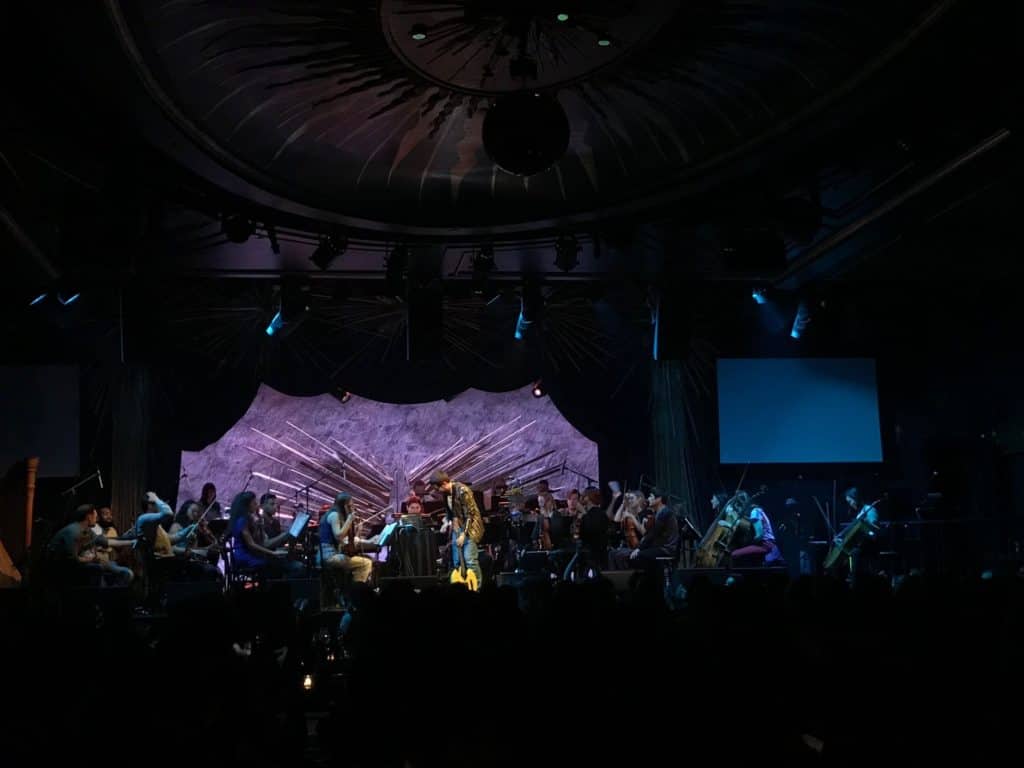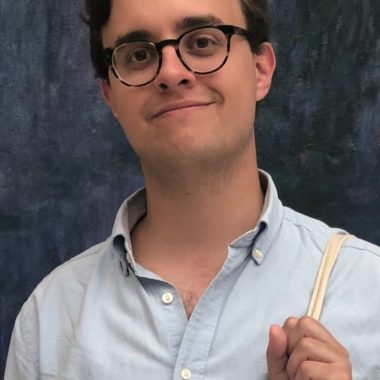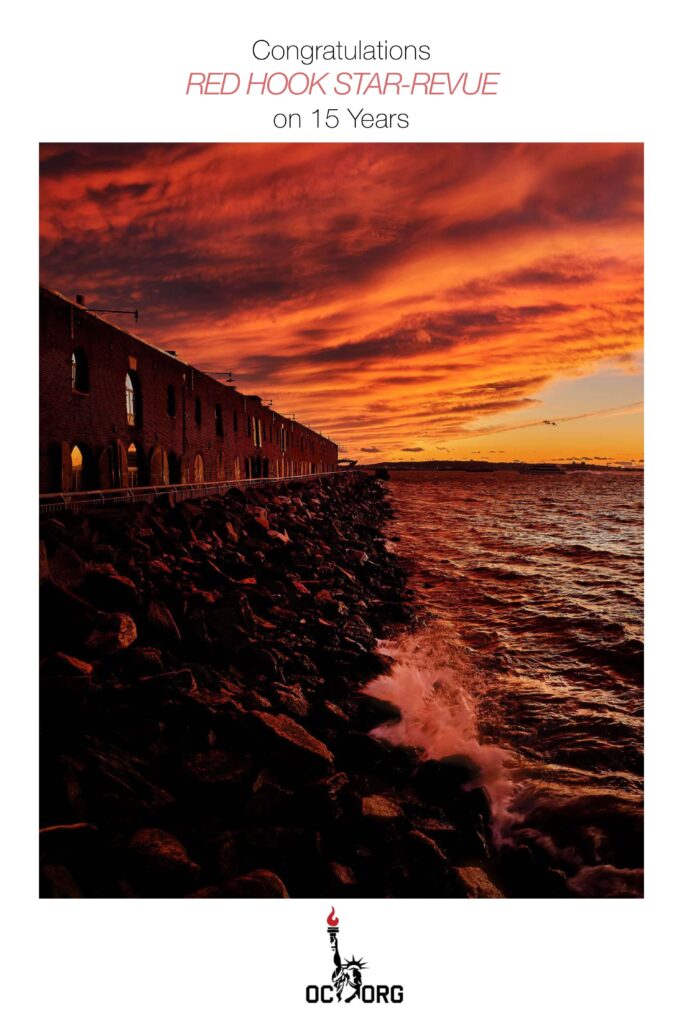Much in the same way as the madeleines that Proust wrote about so many years ago would involuntarily conjure memories from a single bite, hearing video game melodies takes me back to the safety of my childhood living room floor, to hours spent cross-legged, lost in digital adventures scored to these enduring songs. This is the power of the music of the 8 Bit Big Band, a 35-plus-piece jazz pops orchestra that performs and brings to life these tunes like never before. Originally gaining popularity through their YouTube channel, the group started live performances last summer.
The group performs these songs – originally composed using a limited arsenal of MIDI tones – through lush collections of horn, woodwind, and string sections; your standard-fare drum set, guitar, upright and electric bass; as well as more unusual instruments, such as the Japanese wood flute, the shakuhachi. This sheer volume of participants, as well as their incredible musicianship and technical ability, have the effect of expanding nostalgic little digital experiments into sweeping symphonic arrangements, a sound somehow familiar and uncanny, and an absolute joy to hear.
The group is the brainchild of multi-instrumentalist, arranger, and band leader Charlie Rosen, who conducts, arranges, and performs the band’s interpretations of classic and new video game songs. Rosen, who plays more than 70 instruments himself, has orchestrated and performed on many on- and off-Broadway productions and television shows, most recently orchestrating the Broadway musical Be More Chill and contributing guitar to The Marvelous Mrs. Maisel. He himself has contributed to video game soundtracks, playing drum set and other instruments for Rockstar’s Red Dead Redemption 2. Rosen regards the oeuvre of video game music as a whole – which he refers to as the “Video Game Songbook” – akin to what the Great American Songbook was for a different generation.
As the band started their first arrangement, a medley of songs from Super Mario Brothers 1 synchronized to a video of gameplay, the energy and excitement of the crowd was beyond palpable, with many erupting in riotous joy from hearing the music of their childhoods rendered like never before. Many of the arrangements took novel approaches, such as the group’s rendition of the end credit song “Still Alive” from the Portal series, done in the style of Frank Sinatra’s “I’ve Got the World on a String.”
Other adaptations included the “Luigi’s Mansion Theme” melded together with Benny Goodman’s “Sing Sing Sing,” and the Tetris theme imbued with an abundance of Russian influences. The acoustics benefited the dark corners of Sony Hall I found myself drawn to, and listening to the group take on four tracks from Mario Kart 64 (again with attendant synchronized gameplay video, as if the audience had congregated to watch an older sibling show them the ropes around an N64), I couldn’t help but smile when every song started, hearing how lovingly each tune had been revitalized in this setting.
 Some of the older games revisited, on systems such as the 8-bit Nintendo Entertainment System (NES) released in 1983, had only a total of five voices used to create the tunes. Despite these limitations, the resulting songs, from games such as The Legend of Zelda (1986), have had an enduring legacy for a certain generation who can now instantly and reliably satisfy any earworm through a medley of streaming services on the market. The beauty of the 8 Bit Big Band is how Rosen is able to flesh out songs that were originally heard in a context where this variety of choice was not available; video game music is necessarily nostalgic because it transports us to a time when many decisions were out of our hands, where the full experience of play was not considered a piecemeal sum of its parts. Where Rosen shines is his ability, through a devotion to a kind of collective memory, to bring background into foreground, and create a common experience that rises above mere nostalgia.
Some of the older games revisited, on systems such as the 8-bit Nintendo Entertainment System (NES) released in 1983, had only a total of five voices used to create the tunes. Despite these limitations, the resulting songs, from games such as The Legend of Zelda (1986), have had an enduring legacy for a certain generation who can now instantly and reliably satisfy any earworm through a medley of streaming services on the market. The beauty of the 8 Bit Big Band is how Rosen is able to flesh out songs that were originally heard in a context where this variety of choice was not available; video game music is necessarily nostalgic because it transports us to a time when many decisions were out of our hands, where the full experience of play was not considered a piecemeal sum of its parts. Where Rosen shines is his ability, through a devotion to a kind of collective memory, to bring background into foreground, and create a common experience that rises above mere nostalgia.
The evening’s performance included a revolving cast of characters including saxophonist-vocalist Grace Kelly, saxophonist Carlos Eiene (insaneintherainmusic), bassist Adam Neely, and clarinetist Mark Dover, who had the night prior performed with the band Vulfpeck at Madison Square Garden. A particular standout arrangement featuring Neely on five-string bass was “Saria’s Song” from the N64 classic Ocarina of Time, arranged in the style of Jaco Pastorius. Oft arranged because of its popularity, tonight’s version interspersed the main melody with groovy bass interludes featuring harmonics and melodic progressions. The group concluded the evening with the same song they ended their debut May 2019 performance with, a stirring Spanish flamenco-inspired rendition of Gerudo Valley, also from Ocarina of Time.
Author
-

Piotr Pillardy is an arts/music writer for the Red Hook Star-Revue. He received a BA in History of Art and History from Cornell University and lives in Brooklyn
View all posts
Piotr Pillardy is an arts/music writer for the Red Hook Star-Revue. He received a BA in History of Art and History from Cornell University and lives in Brooklyn
Discover more from Red Hook Star-Revue
Subscribe to get the latest posts sent to your email.












